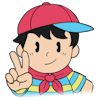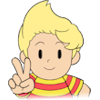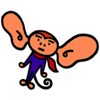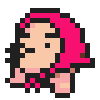Weekly Famitsu – June 19th, 1992
by: 8lackSphinx on 4/27/2020
Itoi: In the last game, MOTHER 1, Giygas appeared as the final boss, but he didn’t actually end up dying. That’s why the subtitle this time is “Giygas Strikes Back.” It’s really straightforward, but it fits [laughs]. So it’s pretty clear that he’s the one you face at the end!
Weekly Famitsu Representative: Does that mean the main character is the same as last time?
Itoi: The player names the main characters, so those who played M1 might use those same names this time. But people who started the series from M2 might feel like everything starts at that point. That’s why you can either see them as the same kid, or as two different kids.
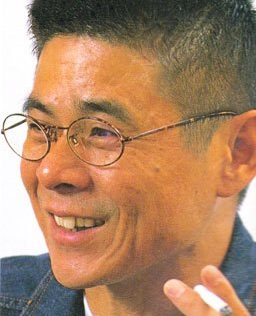
Weekly Famitsu Representative: Hmm, like it could go either way.
Itoi: I see no problem with thinking of them as the same person. It’s fine if people see them as different, though. I leave it up to them to decide.
Weekly Famitsu Representative: Is the hero’s father gone again?
Itoi: It’s another fatherless household [laughs]. I never have kids come from a stable home. They’re perfectly happy, anyway.
Weekly Famitsu Representative: Are there three members in the party this time, too?
Itoi: There are allies that join you at times, so at the most, I think it reaches five people. Non-playable characters and stuff.
Weekly Famitsu Representative: Like the robot in M1?
Itoi: Yeah, something like that [laughs].
Weekly Famitsu Representative: Is there a trick to it?
Itoi: No, there’s no befriending enemies. Like I’ve said, enemies are enemies.
Weekly Famitsu Representative: Does it take place in America?
Itoi: Well, it’s not like M1 was specifically set in America, either. But this time there’s an even more “international” feel to it. Even the friendships feel international. Dealing with a party of characters from different cultural spheres is no easy task for children [laughs].
Weekly Famitsu Representative: Do the enemies turn out to be aliens again?

Itoi: It’s a little more complicated than that. It’s not like before, with lackeys supported by their boss—there are separate entities now with hierarchies of their own. Some enemies have nothing to do with a boss, so it’s pretty complicated.
Weekly Famitsu Representative: Which means…
Itoi: Not thinking about how complicated it is when you’re playing through it, but coming across situations that make you think, “Whoa, there’s guys showing up like this, now?!”. Well, how can I explain it—I think MOTHER 2 is a little closer to actual society. So early on the towns don’t quite have the shadow of Giygas looming over them yet. People might think of this as just some ordinary game.
Weekly Famitsu Representative: What about the supernatural powers?
Itoi: I made them really easy to use. I don’t like stuff that makes you like, “Alright, I’ll choose this one, and then put it with this one, and this one, and—arghhh!”. So I didn’t bother. You can play with as many items as you want, but RPGs that have spells and magic in a fancy class system are so frustrating that I just indulged in my own tastes and cut them out [laughs].
Weekly Famitsu Representative: And it only seem to get more complex as the sequels go on.
Itoi: It’s easy to do that. To just inflate it. It’s like those old bikes geared at middle-schoolers, where they come out with all those flashy add-ons and the kids are left wondering why they have to operate gaudy blinkers just to turn. It’s pretty sad [laughs].
Weekly Famitsu Representative: How about the AI during battle?
Itoi: It’s got Auto Mode again [laughs].
Weekly Famitsu Representative: There wasn’t exactly an Auto Mode in M1, though…
Itoi: I guess. It’s set now so the skilled kids will be worse off when they use it, and the unskilled ones will be better. Automatic is automatic—it’s got the brains of an automatic clothes dryer [laughs].
Weekly Famitsu Representative: Are there any new commands?
Itoi: There aren’t any new command systems in the menu, but the windows have a little twist to them. There are some new methods within the old system that you should scope out.
Weekly Famitsu Representative: Such as…
Itoi: Like with messages. Take the HP display, for example. If you get hit for five points, your HP goes down by five. The meter sort of spins, like a drum roll. You know those odometers in cars? The numbers spin and drop, “doo-doo-doo-doo”. Of course the numbers are displayed, but at the same time there’s this sensation we get from that visualization of a drum roll. I wanted to make it subconsciously entertaining. And I wanted to make a video game that didn’t just reek of—well, video games.
Weekly Famitsu Representative: Your last work was three megabits on the Famicom, and this time it’s twelve megabits on the Super Famicom; so what’s different this time?
Itoi: The things that’ve changed the most clearly are the towns and the people in them with their scripts. Role playing games are defined by characters who’ve turned into cut-out dolls. But in M2, each person is different—I knew I could include details like that. That’s all possible thanks to the increased capacity.
Weekly Famitsu Representative: Is every person different?
Itoi: Well, the faces are pixellated, so in that sense they’re not all that different—but I personally wrote every line in the script, so their personalities are different. There are some guys who are kinda sneaky, and some who are totally sneaky, and then there are some who are visibly dirty, some who are actually good people on the inside, and some who are liars. Saying it like that, though, makes it sound like there aren’t any decent people in the game [laughs].
Weekly Famitsu Representative: Does the beloved train from the last game make an appearance this time around, too?
Itoi: Even better! It won’t make an impression on anyone if there’s nothing but trains. After all, modes of transportation are the appeal of MOTHER [laughs]. There’s a wide variety of gadgets.
Weekly Famitsu Representative: How big are the cities?
Itoi: Some stuff wasn’t received very well, but we were pretty obstinate in keeping M1’s diagonal point of view and town size. The old system of walking on a map into the town-symbol to enter a town is something that we really couldn’t fathom using. Plus we wanted some enemies to appear in the towns, too. We think of the inside of a town as an extension of the field; we did it with the intention of making the size and the length of the story itself two and a half times bigger.
Weekly Famitsu Representative: So was the character design done by Minami Shinbou again?
Itoi: This time it was Oyama. He’s always worked with toys and computers, so it worked out well. The graphics are at the point where I’d just say, “Ah well, even if it doesn’t make it as a game, I’ll buy it”. [laughs]
Weekly Famitsu Representative: Last time, aside from the scenario, there was quite a bit of freedom. How about this time?
Itoi: There are more straight paths in the story to accommodate the events. But we made sure that there was a lot more to do—I think it’ll be most fun for those playing an RPG for the first time, seeing as they’re apt to wander around aimlessly. Even with the most menial little things, I want someone who rushed through the game to watch that beginner playing and feel a twinge of regret and think, “Hey, I never saw that!”.
Weekly Famitsu Representative: Has your own run-in with buried treasure influenced MOTHER 2, by any chance?
Itoi: It has [laughs]. It’d be sad if we couldn’t fit something that fun into a game.
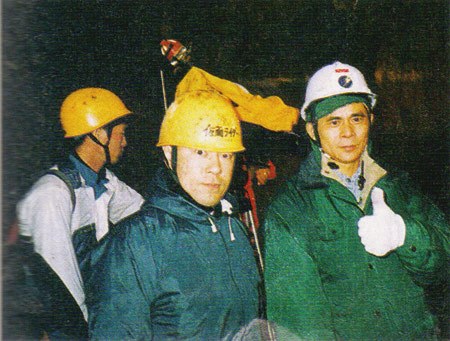
Weekly Famitsu Representative: There’s someone who digs for gold?!
Itoi: There is, there is. He’s not completely unrelated to the story, though—there is a little correlation.
Weekly Famitsu Representative: What about your actual gold-digging?
Itoi: We’re going to go dig some more after the rainy season lets up. At that point I think we’ll have inadvertently let M2 run off on its own [laughs].
Weekly Famitsu Representative: It’s fun watching the show.
Itoi Gold-digging itself is an RPG, you know? But the difference between it and a game is how in gold-digging you think some gold is actually going to turn up. You dream about it for just a moment, and you’re convinced you know where it is. I’ve since become more modest about it, though [laughs]. The greed and everything is sort of alleviated by the feelings you get when you’re 200 feet below the ground, witnessing traces of other people. But it’d still be nice to ramp up those power shovels just a little bit…[laughs]. Working at Akagiyama has this sense of excitement to it, like an action game coupled with the thrill of speculation, of wondering if gold will actually turn up. And then you’ve got the prospectors who have been out there for a hundred years—they’ve had all kinds of speculations over that span of time. They gather sponsors by broadcasting false information and convincing others that the gold is right under their nose. The cycle of deceit just keeps on going. So you’ve got to do this with the understanding that there’s very little reliable information available. At that point, when you’re wondering what’s so great about this job, it turns into, “Man, so-and-so from that project team is really on a roll today,” or “So-and-so’s wife made such-and-such and brought some in”. It’s really amazing to have relationships with other people where you can laugh and cry together. So in games, too, that “human relationship” makes things interesting—this is evident in MOTHER 2, as well. The fighting and battling isn’t important. It’s great to see someone do their very best, no matter what that may be.
Weekly Famitsu Representative: So in the end, is it about mankind?
Itoi: Maybe. The theme might be something like relief at having others around you, and not being some lowly human all by yourself. To stretch the point a bit, I could say that if I were the only one on the entire planet, it wouldn’t be any fun at all. For people who really love games—at least when it comes to games played alone—I’d want to tell them to go outside. Playing games is fun, but it can’t turn into doing that all the time. When you play soccer, it’s fun to get a game going, but it’s not fun if you’re doing nothing but having soccer games. Wouldn’t you want to add some dimension to your enjoyment?
Weekly Famitsu Representative: So what’s this about a CD-ROM?
Itoi: Ah, yeah, we’re going to do one. It’s decided. We’ve been thinking about it alongside this game. We’ve also decided what kind of game we’re going to make. Whether it’s going to be MOTHER 3, I’m not sure, but it’s going to be awesome. I thought of it in the middle of the night—it was enough to make me rush and call my friend about it. Plus there’s sort of a hint to it in MOTHER 2. I can’t name any specifics because it’s about the next game, but we’re doing a CD-ROM. For the Super Famicom.
Weekly Famitsu Representative: So it’s an RPG, right?
Itoi: Well, even with MOTHER 2, I feel like it isn’t really in the RPG category. Like, making an RPG out of a game and making it out of a story are two different things. RPGs often refer to games in which one plays the part of the character, but even more than role-playing it usually seems like a simulation game. I don’t know if there’s any other way of putting it. Hmm, but you know, the CD-ROM game after MOTHER 2 is gonna be a good one. Won’t do much good if I just go around barking, “It’s so good!” though [laughs].
Weekly Famitsu Representative: And when will that be?
Itoi: Well, it’s going to be a while! After all, MOTHER 2 has taken about three years already. I feel really bad about that, but I have been preoccupied with my regular work [laughs].
Weekly Famitsu Representative: What games have you played recently?
Itoi: Nothing but Itadaki Street [laughs]. I’ve tried different games at the recommendation of other people, but I can never really get into them. I don’t know if it’s just because of my age, but I can’t really get into it if there’s not some level of depth to it.
Weekly Famitsu Representative: What about Super Famista?
Itoi: Won’t buy it. I’m sick of Famista [laughs]. The one I’m looking forward to right now is Koushien 2. I can’t wait. It was enough to make me go buy a used copy of Koushien 1. I have a copy already, but I wanted one more to bring home so I looked for another one. I checked the used game stores and asked around, but I couldn’t seem to find one anywhere. And one day, by chance, I came across one for sale at a cart in Gorakuen Stadium. Oh, I was so happy! The field is realistic in it. I’m waiting for Koushien with bated breath [laughs].
Weekly Famitsu Representative: So are you done with RPGs?
Itoi: Well I played Zelda. But halfway through I couldn’t quite keep up with it, so I passed it off and just watched from behind. I ended up watching Final Fantasy IV, too. I just feel like, “Okay, I get it, now what?!”. I hate when I reach that point where I “get it”. The joy is in the reader and the writer solving the mystery together…right now I’m working on Monopoly for the Super Famicom with Tomy. Monopoly is more of a tool, but when you play through it you get a sense of the appeal of multiplication. There is not one game out there that boasts, “It’s even fun when played with a boring person!”. To me, a one-player game is a face-off between me and the player. As the creator, I’m competing against the player on the other side. So if I’m a boring person, their opponent is boring.
Weekly Famitsu Representative: But Monopoly seems simple and boring when you just look at the board, doesn’t it?
Itoi: Yeah, one might think that. I mean, you quietly think things through, evaluate what move your opponent is going to pull, bluff your intentions. There’s this integration of human emotion and strategy in Monopoly. In single-player video games, the amount of human tactic involved is a battle between the player and the programmer who assembled it, so the programmer can’t just go and lose to the player. If you’re set on making a game, if you can’t be strong enough to absolutely dominate, you don’t have what it takes to do it. The Monopoly that’s out right now was made by an American, but it’s terrible [laughs]. Turns you off to think of playing against someone who’s that awful at it [laughs]. Seriously. MOTHER is a competition. It’s a game where the production team and you—the player—become good playmates and enemies. Actually, you can’t see it, but MOTHER 2 is a competitive game, too! [laughs] I’ll just leave it at that!



